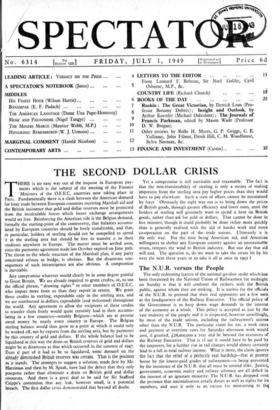THE SECOND DOLLAR CRISIS
Any compromise whatever would clearly be in some degree painful to Great Britain. We are already required to grant credits, or, to use the official phrase, " drawing rights " to other members of O.E.E.C. who import more from us than they export in return. We grant those credits in sterling, expendable only in the sterling area, and we are reimbursed in dollars, expendable (and welcomed) throughout the world. Any agreement to allow the recipients of these credits to transfer them freely would quite certainly lead to their accumu- lating in a few countries—notably Belgium—which are at present owed money by nearly every country in Europe. The Belgian sterling balance would thus grow to a point at which it could only be worked off, not by exports from the sterling area, but by payments by this country of gold and dollars. If the whole balance had to be liquidated in this way the drain on British reserves of gold and dollars might be as disastrous as that which occurred in the summer of 1947. Even if part of it had to be so liquidated, some demand on the already diminished British reserves was certain. That is the position as it stands. The attempts to suggest a solution, made first by Mr. Harriman and then by M. Spa, have had the defect that they only postpone rather than eliminate a drain on British gold and dollar resources. And there is a great deal to be said for Sir Stafford Cripps's contention that any leak, however small, is a potential breach. The first dollar crisis demonstrated that beyond all doubt.
Yet a compromise is still inevitable and reasonable. The fact is that the non-transferability of sterling is only a means of making importers from the sterling area pay higher prices than they would have to pay elsewhere. Such a state of affairs cannot be maintained by force Obviously the right way out is to bring down the prices of British goods, through greater efficiency and lower costs, until the holders of sterling will genuinely want to spend it here on British goods, rather than ask for gold or dollars. That cannot be done in five minutes, though it could probably be done rather more quickly than is generally realised with the aid of harder work and more co-operation on the part of the trade unions. Ultimately it is the only way. For the time being American aid, and American willingness to shelter any European country against an unreasonable strain, tempers the wind to British industry. But one day that aid will end. The question is, do we want to take the strain bit by bit over the next three years or to take it all at once in 1952 ?






































 Previous page
Previous page